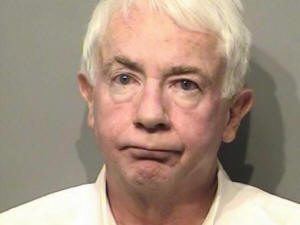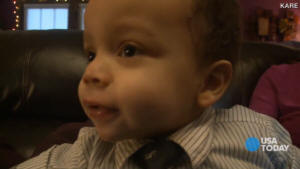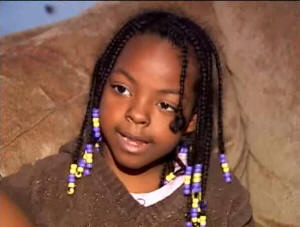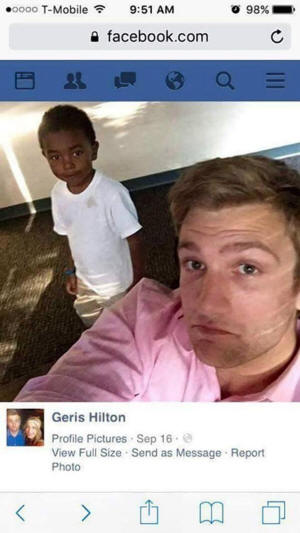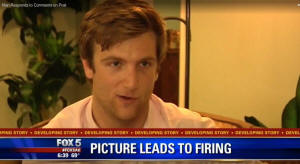by Roxane Gay
OCTOBER 29, 2015
NOTICE: THIS WORK MAY BE PROTECTED BY COPYRIGHT
YOU ARE REQUIRED TO READ THE COPYRIGHT NOTICE AT THIS LINK BEFORE YOU READ THE FOLLOWING WORK, THAT IS AVAILABLE SOLELY FOR PRIVATE STUDY, SCHOLARSHIP OR RESEARCH PURSUANT TO 17 U.S.C. SECTION 107 AND 108. IN THE EVENT THAT THE LIBRARY DETERMINES THAT UNLAWFUL COPYING OF THIS WORK HAS OCCURRED, THE LIBRARY HAS THE RIGHT TO BLOCK THE I.P. ADDRESS AT WHICH THE UNLAWFUL COPYING APPEARED TO HAVE OCCURRED. THANK YOU FOR RESPECTING THE RIGHTS OF COPYRIGHT OWNERS.

Leon Lott, the sheriff of Richland County in Columbia, S.C., suspended the officer who forcibly removed a student from her desk at Spring Valley High School.
ALEX SANZ / ASSOCIATED PRESS
BLACK children are not allowed to be children. They are not allowed to be safe, not at home, not at pool parties, not driving or sitting in cars listening to music, not walking down the street, not in school. For black children, for black people, to exist is to be endangered. Our bodies receive no sanctity or safe harbor.
We can never forget this truth. We are never allowed to forget this truth.
On Monday, in Columbia, S.C., Ben Fields, a sheriff’s deputy assigned to Spring Valley High School, was called to a classroom to exert control over an allegedly disobedient student — a black girl. She wouldn’t give up her cellphone to her teacher, an infraction wholly disproportionate to what came to pass. There are at least three videos of the incident. When Mr. Fields approaches the girl, she is sitting quietly. He quickly muscles her out of her seat and throws her across the room.
The video of this brutality is unbearable in its violence, in what it reminds us, once again, about the value of black life in America, and about the challenges black children, in particular, face.
Schools are not merely sites of education, they are sites of control. In fact, they are sites of control well before they are sites of education. And for certain populations — students of color, working-class students, anyone on the margins — the sites of control in the school system can be incredibly restrictive, suffocating, perilous.
Statistics from a recent study showed that in South Carolina, black students made up 36 percent of the population and accounted for 60 percent of suspensions. It is disheartening, at best, that even school discipline is applied disproportionately. And what took place at Spring Valley High goes well beyond disproportion.
In the wake of such indecency, there has been a vigorous public response — shock and outrage, with many people denouncing Mr. Fields’s actions. There have also been those who questioned what the young girl did to beget such brutality and sought for her to take responsibility. Oh, how we are, as a culture, enamored with this ideal of responsibility when we don’t want to acknowledge the extent of an injustice or when we want to pretend that if we behave well enough, we will find the acceptance we have long been denied.
Sheriff Leon Lott defended some of his deputy’s actions and called for the young girl to accept responsibility, too. The sheriff also revealed that the deputy was dating a black woman, as if through such intimate connection, Mr. Fields might be absolved of any racism or wrongdoing. Nonetheless, Ben Fields has been fired and the Department of Justice has begun an investigation. There is the faintest hope that finally, justice will be done.
And yet, we have these inescapable reminders that no form of justice after the fact can erase trauma, or bring people back to life. There are the precedents of Eric Garner, Walter Scott, Samuel DuBose, Christian Taylor, and this is a list that has no end. When black people commit or are perceived to have committed infractions, the punishment is severe — physical brutality, prison or death without due process.
There are always questions, so many questions that elude both common sense and the heart of the matter at hand. What was the girl doing before the cameras started filming? The CNN anchor Don Lemon asked this question on the air. Why didn’t she comply with white authority? Why didn’t she just behave, fall in line? This question came from Raven-Symoné, a co-host of “The View,” also on the air.
Time and again, in such situations, black people are asked, why don’t we mind our place? To be black in America is to exist with the presumption of guilt, burdened by an implacable demand to prove our innocence. We are asked impossible questions by people who completely ignore a reality where so many of the rules we are supposed to follow are expressly designed to subjugate and work against our best interests. We ignore the reality that we cannot just follow the rules and find our way to acceptance, equality or justice. Respectability politics are a delusion.
Far too little attention is being given to who the young girl is, or that, according to the lawyer representing her, she is in foster care. When that officer saw her, sitting quietly, defiantly, she was not allowed to be human. She was not allowed to have a complex story. She was held to a standard of absolute obedience. She was not given the opportunity to explain the why of her defiance because she was a black body that needed to be disciplined by any means necessary.
Michel Foucault — the philosopher who was deeply concerned about power and how power was enforced — wrote of the panopticon, inspired by the work of Jeremy Bentham, who designed a prison where prisoners could be watched without knowing when or if they were being watched. Discipline, in such a structure, would be enforced by prisoners never knowing when the watchful eye would be turned toward them. We can certainly see how the panopticon functions in any organization predicated on hierarchies of power and the preservation of that power.
Technology has made the world a panopticon. It has widened the range of who watches and who is watched. Each day, we learn of a new injustice against the black body and in many cases, we now have pictures, videos. We have incontrovertible evidence of flagrant brutalities though, sadly and predictably, this evidence is never enough. At some point, this evidence, these breathtaking, sickening images, will render us numb or they will break our hearts irreparably. There is no respite from the harsh reminder that our black bodies are not safe. The black bodies of those we love are not safe.
We are watchers and the watched, and we are burdened, never knowing when our best, or our most abject, moments will be preserved digitally and disseminated virally, exposing the vulnerabilities we aren’t allowed to keep to ourselves.
Given how pervasive surveillance has become, I would think the black body, black people would be safer. I would think that police officers or assorted racists would think twice before acting, inappropriately, against the black body. It is a horrifying, desperate reality where such people act with impunity, undeterred by the threat of surveillance. They know they might be seen and remain empowered in their racism, their sense of dominion. They realize the nauseating truth — there are some injustices, against certain groups of people, that can be witnessed without consequence.
Roxane Gay is the author of “An Untamed State” and “Bad Feminist” and a contributing opinion writer.

